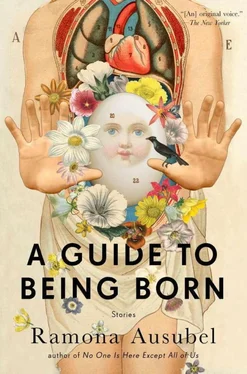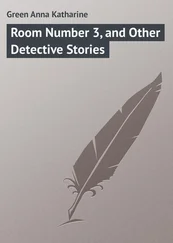Ramona Ausubel
A GUIDE TO BEING BORN
Stories
For Teo and Clay, my loves
BIRTH

THE GRANDMOTHERS—dozens of them—find themselves at sea. They do not know how they got there. It seems to be afternoon, the glare from the sun keeps them squinting. They wander carefully, canes and orthotics, across the slippery metal deck of the ship, not built for human passage but for cargo. Huge shipping crates are stacked at bow and stern. The grandmothers do not know what it means. Are we dead? they ask one another. Are we dying? Every part of the ship is metal, great sheets and hand-sized rivets. Cranes and transverses and bulkheads and longitudinals—all metal. All painted white and now splayed with the gray stars of gull droppings.
Among the many hunched backs and stockinged legs, there is a woman named Alice, who finds the nicest bench and sits down on it. The bench looks out at the horizon, that line drawn by the eye to make an ending where there is not one. Alice is a lover of views, of great expanses, and she is happy now as she has always been, to look out. She thinks of her children on faraway spits of land. They have their studios and paints, their meditation cushions, their cars in need of oil changes and their grocery lists. She thinks about her one new great-granddaughter whom she has never met but who she hopes is wrapped in the gray blanket she knit.
Around Alice there are varying levels of commotion and flurry. Does anyone have a compass? Do you know how to drive a ship? Where is my nurse? I’m from the DC area!
There are some grandmothers who try to escape immediately. They get in a rescue craft tied to the side of the ship and sit holding their pocketbooks, waiting patiently to be lowered down to the tattered blue. Their faces become wet with wind-water, but they are not lowered. Their hairdos begin to wilt, but still, they do not get lowered.
There is the group of ladies whose eye makeup travels in dark tracks down cheeks; the group of proactive grandmothers who have taken scraps of paper and pens from their pocketbooks and are brainstorming a list of suggestions, diagramming these suggestions in order of popularity and feasibility. In front of Alice is the group of rememberers, recounting as if centuries had passed, their lives. It used to be so easy , they remember at high volume due to a common loss of hearing. There were lovely smooth roads, and it was possible to get in the car and drive to different places where the pancakes were especially good, where the coffee was flown in from Italy.
But even in this situation, extraordinary and new, even with the churning ocean surrounding them completely, many of the grandmothers make small talk. They compliment each other’s earrings. Are those pearls freshwater? The color reminds me of the curtains my mother bought on a trip to Bangkok, where she met the princess, if you can believe that.
Alice is joined by someone whose name she does not even listen to. The woman says, “You are from Chicago, you say. How is Chicago this time of year?”
“Well, it’s very cold on one day and then it’s very warm the next day.”
“And your children, what do they do?”
“I have two painters, a woodworker and a writer.”
“How interesting ,” the woman says. “Mine are all lawyers. I have six.”
“My father was a lawyer.” Alice smiles. “It was a terrible way to grow up. I’m glad none of mine went that way.” The woman’s facial muscles seem to harden but are subverted by the skin hanging soft, always, no matter how tight her smile or her frown.
“It’s possible I’m dead,” Alice says, looking at the differing blues of sky and water.
“I’m sorry.” Though the woman is looking at Alice, she seems to be most sorry for herself.
Alice nods. “Yes, I guess I might have died. Or be dying.” She remembers a hospital room and behind the bed a wall of machines, each emitting a very distinct beep that would draw a different nurse with a different tool. One brought Linda with a suction pump that gathered, painfully, the mucus from Alice’s lungs. One brought Kera with a new bag of liquid food to be attached to the feeding tube. The room was always half dark, permanent evening. At all times at least one of her relatives was in the room.
Uneasily, the woman comforts, “I’m sorry to hear that.”
Alice nods again and stretches her legs out, covered in the skin of stockings, and wiggles her feet at the ends.
“Am I dead too, then?”
“I don’t know. Did you die?” Alice asks.
“I don’t remember dying.”
“Well, maybe you didn’t.”
• • •
UNDER THE SETTING SUN, the ship is stained red. The deck looks like a high school cafeteria with small clusters of ladies huddled close together, constellated out over the surface. They remember to worry about things they had forgotten to worry about at first. The slippery surface is of great concern to many who fear the breaking of hips. They fret over husbands, who have been left at home with nothing in the refrigerator. Cats are likely pawing the heavy legs of couches. The couches will never survive the absence of the grandmothers. This will be the end of the couches. They talk about this. They huddle against the wind.
Some grandmothers who are quiet in the huddles do not have these things to go back to. Some have not turned off their televisions in years, not in the morning or at night. They have freezers full of food ready-packed for quick eating, and the dents in the cushions where they sit all day, their faces dimming and brightening in the light, are severe. The dents do not re-puff, because they do not have a chance to do so. They are always under-butt. These grandmothers nervously check their watches still set to home-time, knowing that right now, right at this moment when the sun is falling, Pat Sajak is about to welcome them, with the help of his generous audience, to Wheel! Of! Fortune! Even though they will miss this television evening, those grandmothers, the ones with no one, are not so sorry to be here at sea with so many warm bodies.
While they trade stories of survival, the proactive grandmothers who have no time for idle worrying are on a mission to find out what is inside the crates on deck. A set of bolt cutters has been discovered in the engine room. The engines were discovered there as well but were much too complicated to operate, so the ship continues to float, unrumbling.
These women have been in strange situations before. “In Bermuda,” someone says, fingering the gold buttons on her cardigan, “right in the middle of our perfect vacation, a hurricane hit and we had to take the little girl who sold shell jewelry into our hotel room for two straight days. Poor thing had never had a Pepsi cola before,” she recalls. “Can you imagine?” the fellow proactive grandmothers marvel.
Alice, meanwhile, walks the edge of the boat, passing a lady whose hands are busy clenching. “Hullo,” she says, nodding to the woman, the rail holder. The look she gets is a short, hopeful one, one that wants to see a man, any man, but a man in uniform especially. Any man in uniform with some kind of list. When she looks up to see another sagging female, she deflates.
Alice has been on a lot of boats. While she runs her hand along the railing, she remembers the first time and the last—love early, love late. When she was seventeen years old, after an expensive wedding at her parents’ country house with none of her friends in attendance, she spent the first week as a wife on a sloop off the coast of Rhode Island. The first night, after navigating out of a very tricky harbor in a storm, her victorious husband came into the cabin where Alice was curled up. The small boat tossed in the heavy wind.
Читать дальше














